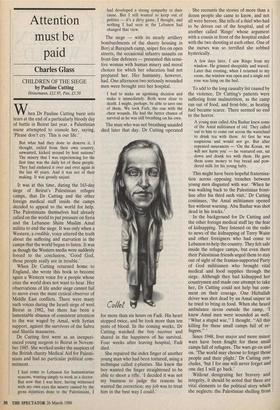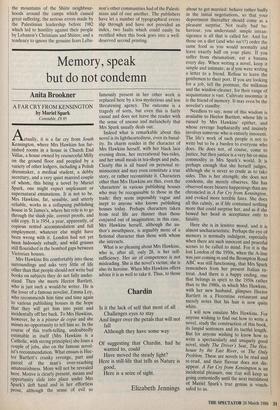Attention must be paid
Charles Glass
CHILDREN OF THE SIEGE by Pauline Cutting Heinemann, £12.95, Pan, £3.50 When Dr Pauline Cutting burst into tears at the end of a particularly bloody day of battle in Beirut last year, a Palestinian nurse attempted to console her, saying, `Please don't cry. This is our life.'
But what had they done to deserve it, I thought, exiled from their own country, unwanted, kicked around by host nations? The misery that I was experiencing for the first time was the daily lot of these people. They had endured it over and over again in the last 40 years. And it was not of their making. It was grossly unjust.
It was at this time, during the 163-day siege of Beirut's Palestinian refugee camps, that Dr Cutting and the other foreign medical staff inside the camps decided to appeal to the world for help. The Palestinians themselves had already called on the world to put pressure on Syria and the Lebanese Shiite Muslim Amal militia to end the siege. It was only when a Western, a credible, voice uttered the truth about the suffering and starvation in the camps that the world began to listen. It was as though the Western media were suddenly forced to the conclusion, 'Good God, those people really are in trouble.'
When Dr Cutting returned home to England, she wrote this book to become again a Western voice for a people whose cries the world does not want to hear. Her observations of life under siege cannot fail to move even the most cynical observer of Middle East conflicts. There were many such voices during the Israeli siege of west Beirut in 1982, but there has been a lamentable absence of consistent attention to the war waged by Amal, with Syrian support, against the survivors of the Sabra and Shatila massacres.
Dr Cutting first went as an inexperi- enced young surgeon to Beirut in Novem- ber 1985. She worked under the auspices of the British charity Medical Aid for Palesti- nians and had no particular political com- mitment.
I had come to Lebanon for humanitarian reasons, wanting simply to work as a doctor. But now that I was here, having witnessed with my own eyes the misery caused by the gross injustices done to the Palestinians, I
had developed a strong sympathy to their cause. But I still wanted to keep out of politics — it's a dirty game, I thought, and nothing I had seen in the Lebanon had changed that view.
The siege — with its steady artillery bombardments of the shanty housing in Borj al Barajneh camp, sniper fire on open streets, the occasional infantry assaults on front-line defences — presented this sensi- tive woman with human misery and moral choices for which her education had not prepared her. Her humanity, however, had. One afternoon two seriously wounded men were brought into her hospital.
I had to make an agonising decision and make it immediately. Both were close to death. I might, perhaps, be able to save one of them. We took Fadi, the one with the chest wounds. He had the better chance of survival as he was still breathing on his own.
The man who was not breathing unaided died later that day. Dr Cutting operated for more than six hours on Fadi. His heart stopped twice, and he took more than ten pints of blood. In the coming weeks, Dr Cutting watched the boy recover and shared in the happiness of his survival. Four weeks after leaving hospital, Fadi died.
She repaired the index finger of another young man who had been tortured, using a technique called z-plasties. She knew the boy wanted the finger straightened to be able to shoot a rifle. 'I decided it was not my business to judge the reasons he wanted the correction; my job was to treat him in the best way I could.' She recounts the stories of more than a dozen people she came to know, and not all were heroes. She tells of a thief who had to be driven out of the hospital, and of another called 'Ringo' whose argument with a cousin in front of the hospital ended with the two shooting at each other. One of the nurses was so terrified she sobbed hysterically.
A few days later, I saw Ringo from my window. He grinned sheepishly and waved. Later that evening, when I returned to my room, the window was open and a single red rose was lying on the bed.
To add to the long casualty list caused by the violence, Dr Cutting's patients were suffering from malnutrition, as the camp ran out of food, and frost-bite, as heating fuel became scarce. There seemed no end to the horror.
A young man called Abu Bashar knew some of the Amal militiamen of old. They called out to him to come out across the wasteland to drink tea with them. At first he was suspicious and would not go. But after repeated assurances — 'On the Koran, we will not harm you' — he ventured out, sat down and drank tea with them. He gave them some money to buy bread and pow- dered milk for his young baby.
This might have been hopeful fraternisa- tion across opposing trenches between young men disgusted with war. 'When he was walking back to the Palestinian front- line after his third such visit,' Dr Cutting continues, 'the Amal militiamen opened fire without warning. Abu Bashar was shot dead in his tracks.'
In the background for Dr Cutting and the other foreign medical staff lay the fear of kidnapping. They listened on the radio to news of the kidnapping of Terry Waite and other foreigners who had come to Lebanon to help the country. They felt safe inside the refugee camps, but even there their Palestinian friends urged them to stay out of sight of the Iranian-supported Party of God militiamen who brought vital medical and food supplies through the siege. Although they had kidnapped her countrymen and made one attempt to take her, Dr Cutting could not help but com- ment on their courage. One Hizballah driver was shot dead by an Amal sniper as he tried to bring in food. When she heard ambulance sirens outside the camp, 'I knew Amal men were wounded as well. "What a stupid war," I thought. "All this killing for these small camps full of re- fugees." ' Since 1948, four major and more minor wars have been fought for these small camps full of refugees. The wars go on and on. 'The world may choose to forget those people and their plight,' Dr Cutting con- cludes, 'but I for one will never forget and one day I will go back.'
Without denigrating her bravery and integrity, it should be noted that there are vital elements to the political story which she neglects: the Palestinian shelling from the mountains of the Shiite neighbour- hoods around the camps which caused great suffering; the serious errors made by the Palestinian leadership before 1982 which led to hostility against their people by Lebanon's Christians and Shiites; and a tendency to ignore the genuine fears Leba- non's other communities had of the Palesti- nians and of one another. The publishers have let a number of typographical errors slip through and have not provided an index, two faults which could easily be rectified when this book goes into a well- deserved second printing.



















































 Previous page
Previous page